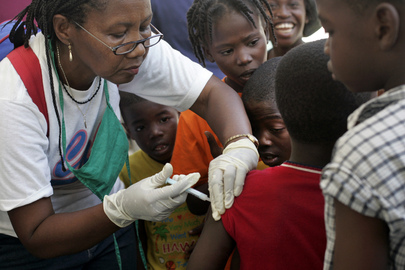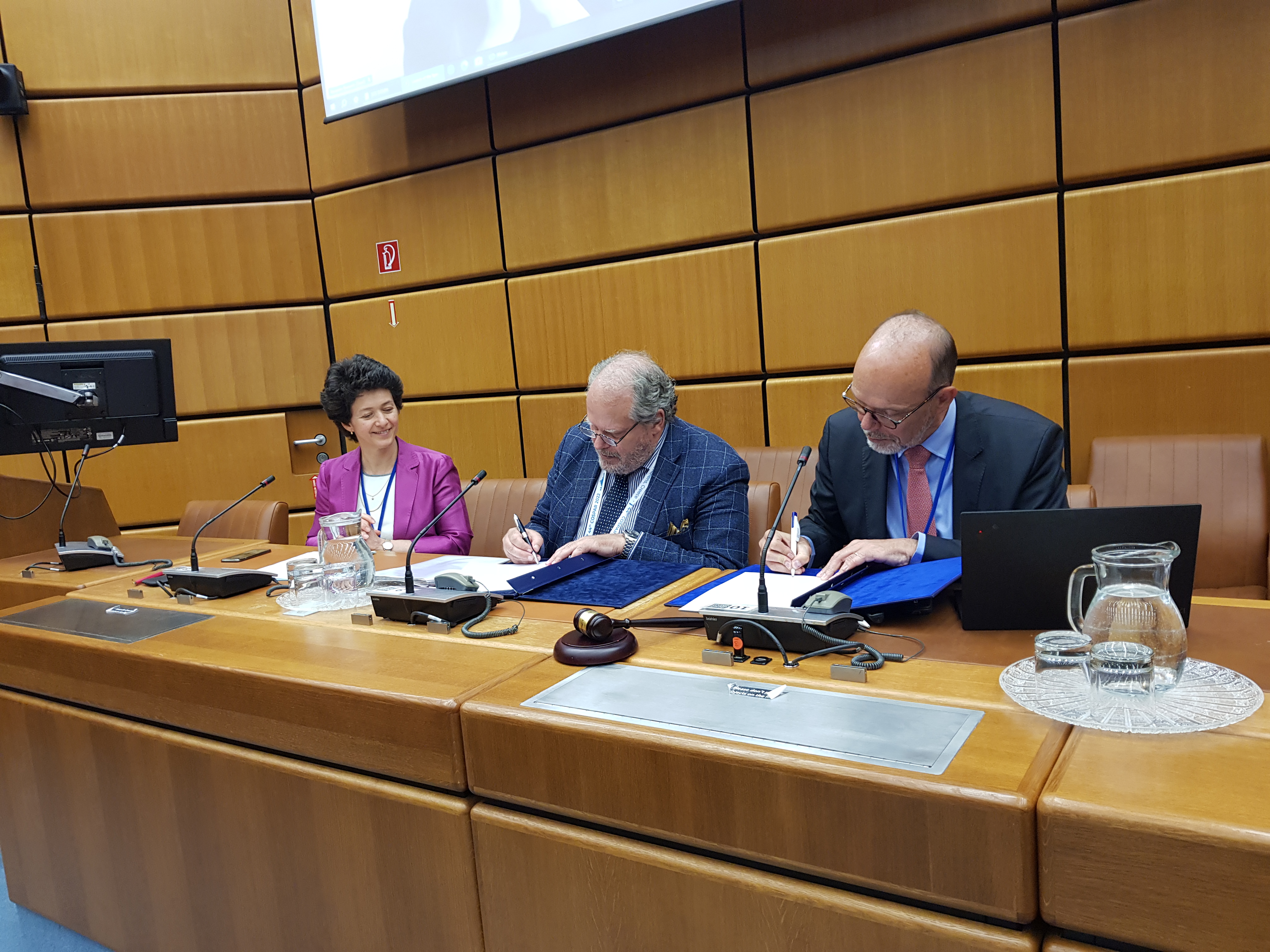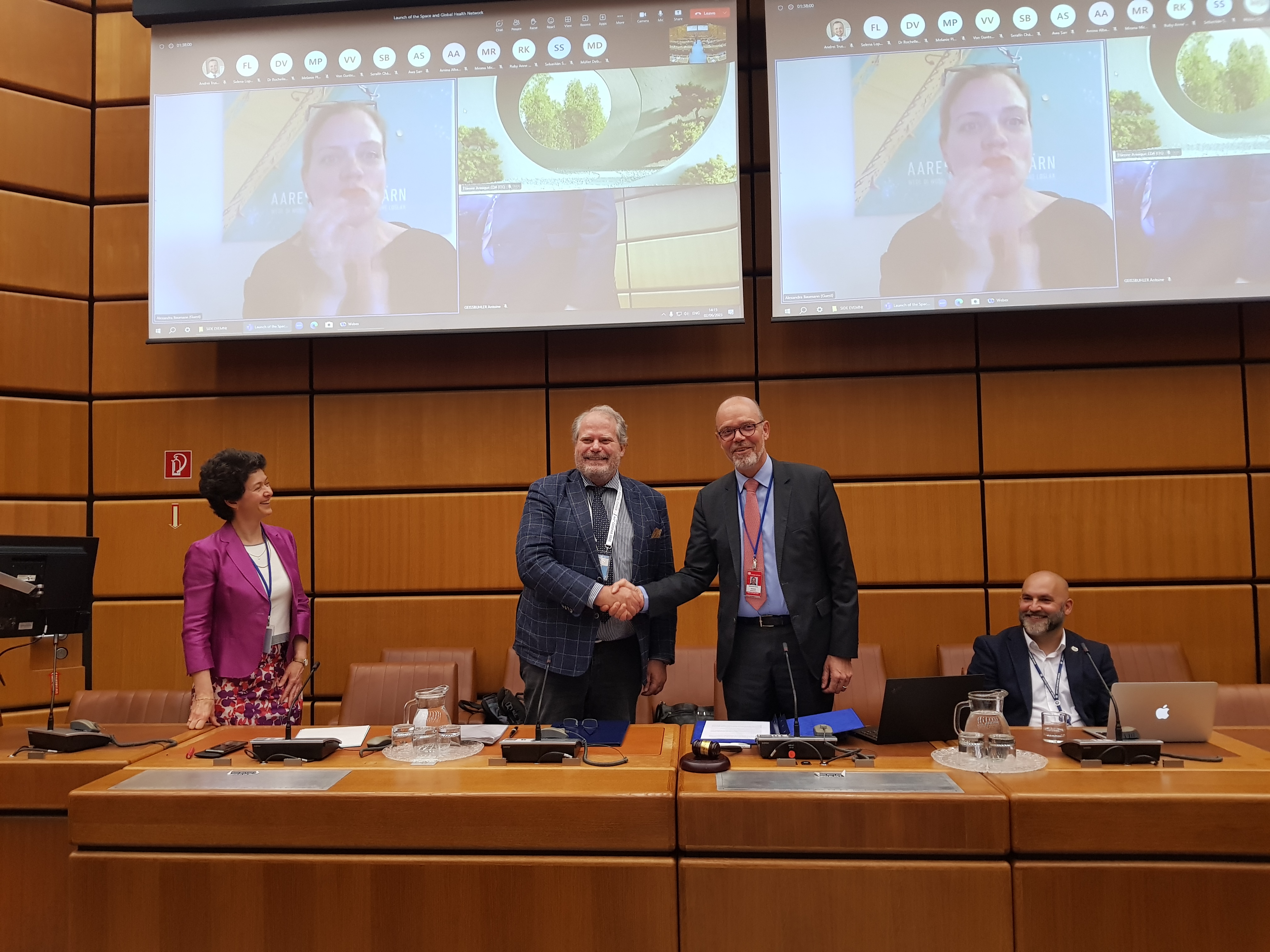Space and Global Health

Each year, non-communicable and communicable diseases and maternal, neonatal and nutrition-related conditions together cause an estimated 50 million deaths worldwide. Innovative approaches to solve health problems are therefore needed to complement traditional good practices in the health sector.
Such approaches include the use of space science and technology for health-related research and development; tele-epidemiology; telemedicine and tele-health, and early warning and disaster preparedness. Space technology contributes to global health by improving access to medical services, monitoring and forecasting the spread of diseases, addressing health issues in preparing for and responding to disasters, and managing environmental and other factors. Innovations developed for space missions often find practical applications in healthcare and public health, ultimately benefiting individuals and communities worldwide.
Upcoming and past events
INTERNATIONAL CONFERENCE ON SPACE AND GLOBAL HEALTH
The United Nations/World Health Organization International Conference on Space and Global Health will be held from 1 to 3 November 2023, in Geneva, Switzerland. The Conference is co-organized by the United Nations Office for Outer Space Affairs, the World Health Organization and the United Nations Conference on Trade and Development, in collaboration with the Government of Switzerland and Space and Global Health Network, and with support from the European Space Agency.
Please click here for information and registration
RECENT EVENTS
Launch of the Space and Global Health Netw ork and the Signing Ceremony
- The launch of the Space and Global Health Network and the signing of the statement of intent by the Office for Outer Space Affairs and the University of Geneva at a side event was held on 2 June 2023 organized by the delegation of Switzerland
- Programme of the event [ File]
- Presentations delivered at the event [ Adam Hawkey]

|

|
MANDATES: UNITED NATIONS GENERAL ASSEMBLY RESOLUTIONS
SPACE AND GLOBAL HEALTH NETWORK AND PLATFORM
The Space and Global Health Network and the Space and Global Health Platform were established by the Committee on the Peaceful Uses of Outer Space at its sixty-fifth session in 2022. On 12 December 2022, the United Nations General Assembly, in its resolution A/RES/71/121, has noted with satisfaction the establishment of the Space and Global Health Platform, based in Geneva, to promote effective collaboration on space and global health issues among Member States and United Nations system entities, in particular the World Health Organization and the Office for Outer Space Affairs of the Secretariat, as well as international organizations and relevant actors, and welcomed the establishment of the Space and Global Health Network, whose work should be facilitated by the Office for Outer Space Affairs within existing resources.
The Space and Global Health Network was launched at the sixty-sixth session (31 May to 9 June 2023). The SGH Network is an open and flexible network of international organizations, governmental institutions, non-governmental entities, other relevant stakeholders, and individuals willing to share experiences and expertise in the fields of space and/or global health, and contribute to the development and/or use of services and tools supporting these goals. To facilitate interactions, it is coordinated by a Network Coordinator, Antoine Geissbühler. The intent of the Space and Global Health Network (SGH Network) is to increase collaboration and cooperation between the space domain and the global health domain. Read the Statement of Intent of the SGH Network.
HISTORY AND BACKGROUND
STSC WORKING GROUP ON SPACE AND GLOBAL HEALTH
In 2018, the Committee on the Peaceful Uses of Outer Space (COPUOS) agreed to introduce a new item on Space and global health in the agenda of the Scientific and Technical Subcommittee (STSC), and also agreed that a working group, established under that agenda item, should be agreed at the fifty-sixth session of the Subcommittee in 2019, with Antoine Geissbühler (Switzerland) as Chair. The Committee further agreed that the Chair of the newly established working group, together with the Secretariat, would present to the fifty-sixth session of the Subcommittee, a proposal for a multi-year workplan for that working group, taking into account the role of the Expert Group on Space and Global Health. The Working Group operated under its multi-year work plan 2019-2022. For more information on the Working Group please click here.
HEALTH AS UNISPACE+50 THEMATIC PRIORITY (2018)
The Committee on the Peaceful Uses of Outer Space at its fifty-ninth session in 2016, agreed on seven thematic priorities of UNISPACE+50, a 2018 commemoration of the fiftieth anniversary of the United Nations Conference on the Exploration and Peaceful Uses of Outer Space ( UNISPACE).
Thematic priority 5 of UNISPACE+50, on Strengthened space cooperation for global health, had the following objectives: (a) Improve the use of space technologies and space-based information and systems in the global health domain; (b) Promote enhanced cooperation and sharing of information in emergencies, epidemics and early warning events, as well as on environmental parameters; (c) Enhance the ability to integrate health data into disaster management plans; (d) Strengthen capacity-building in advancing space technologies in global health efforts; and (e) Identify governance and cooperation mechanisms to support these objectives. Report on Thematic priority 5: Strengthened space cooperation for global health A/AC.105/1172 عربي 中文 English Français Русский Español
The United Nations/World Health Organization/Switzerland Conference on Strengthening Space Cooperation for Global Health was organized as a flagship conference under the UNISPACE+50 Thematic priority 5. The Conference was organized jointly by the United Nations, the World Health Organization (WHO) and the Government of Switzerland, with support from the European Space Agency (ESA), and hosted by WHO at its headquarters in Geneva from 23 to 25 August 2017. Report on the United Nations/World Health Organization/Switzerland Conference on Strengthening Space Cooperation for Global Health, A/AC.105/1161 عربي 中文 English Français Русский Español
STSC EXPERT GROUP ON SPACE AND GLOBAL HEALTH (2015-2018)
To advance the work in the area of space and health, the Expert Group on Space and Global Health of the Scientific and Technical Subcommittee of the Committee on the Peaceful Uses of Outer Space had been established in 2014 and had held four meetings in the period 2015 -2018.
- Fourth Meeting of the Expert Group on Space and Global Health held from 31 January to 1 February 2018, Progress report by co-chairs, Dr. Pascal Michel (Canada) and Dr. Antoine Geissbühler (Switzerland) A/AC.105/C.1/2018/CRP.17 english
- Third Meeting of the Expert Group on Space and Global Health, held on 2 and 3 February 2017, and initial considerations in preparation towards UNISPACE+50, Progress report by co-chairs, Dr. Pascal Michel (Canada) and Dr. Antoine Geissbühler (Switzerland )A/AC.105/C.1/2017/CRP.28 english
- Second Meeting of the Expert Group on Space and Global Health, 18-19 February 2016, Progress report on the activities of the expert group and future considerations, Dr. Pascal Michel, RapporteurA/AC.105/C.1/2016/CRP.21, english
- First Meeting of the expert group on space and global health held on 5 February 2015: Report on the proposed mandate, workplan and initial considerations, A/AC.105/C.1/2015/CRP.29, english
ACTION TEAM 6 FOLLOW-UP INITIATIVE (AT6-FUI) (2011-2014)
Action Team 6 Follow-up Initiative (AT6-FUI) under the leadership of the University of Koblenz-Landau, Germany, held a series of workshops with the support of the Office of Outer Space Affairs, to promote the creation of an open community approach to apply spatial methods in addressing targeted health issues in the world.
UNISPACE III ACTION TEAM ON PUBLIC HEALTH (2001-2011)
The outcome document of the Third United Nations Conference on the Exploration and Peaceful Uses of Outer Space ( UNISPACE III ) , entitled "The Space Millennium: Vienna Declaration on Space and Human Development" declared that in:
- using space applications for human security, development and welfare: action should be taken to improve public health services by expanding and coordinating space-based services for telemedicine and for controlling infectious diseases;
- advancing scientific knowledge of space and protecting the space environment: action should be taken to improve the scientific knowledge of near and outer space by promoting cooperative activities in such areas as ... space biology and medicine... .
The Action Team on Public Health (action team 6) was officially created in 2001 to follow up the implementation of the health-related recommendations of UNISPACE III. The Action Team's mission was defined as to foster the implementation of tele-health for developing countries and improve public health services by facilitating the application of space technologies in early warning of infectious diseases. In 2011, the action team produced its Final Report .
Space and Global Health documents
See below for recent documents relating to Global Health. For more documents, search the Documents Database.